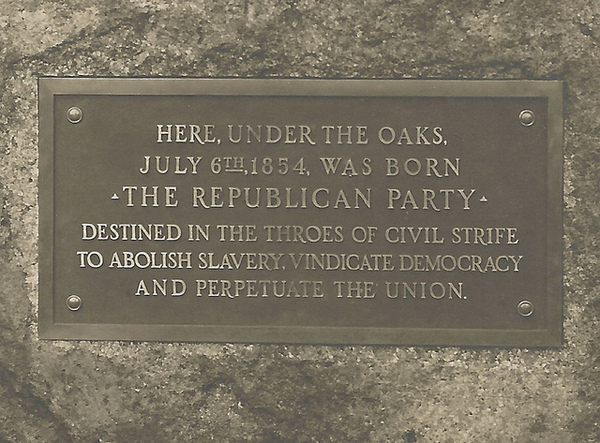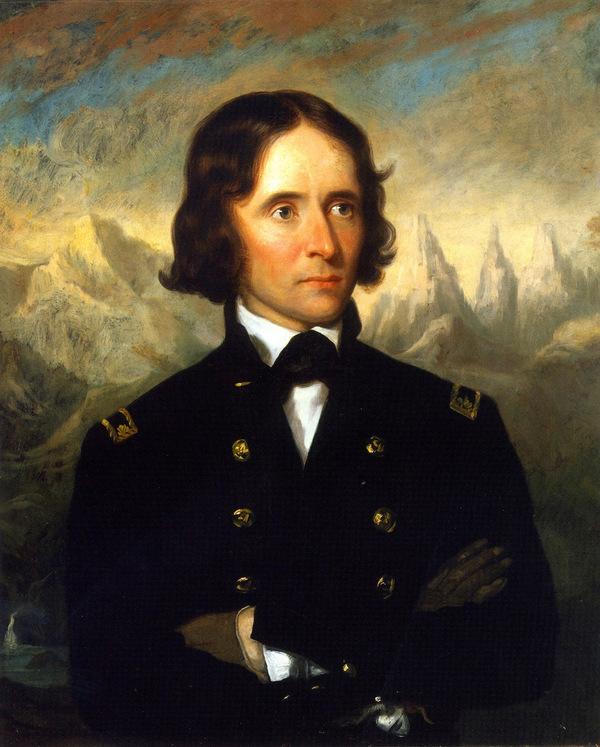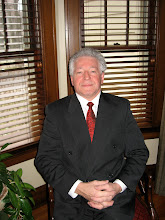On July 6, 1854, more than 10,000 people gathered on the outskirts of Jackson, Michigan, for the first official meeting of the Republican Party. To celebrate the anniversary of this landmark event in U.S. political history, we've put together some trivia questions; try your luck with them to see how much you know about the early years of the Grand Old Party.
Why Was the Republican Party Founded? This historical marker is located at the site of the Republican Party's first official meeting near Jackson, Michigan.Frustrated at the apparent unwillingness or inability of the Whig Party to stop the spread of slavery into America's western territories, disgruntled Whig Party members broke away from their party to form a new political movement opposed to slavery's spread. The seeds for the new political party were first planted at an informal meeting in a schoolhouse in Ripon, Wisconsin, in early 1854. Those meeting in Ripon were determined to find a way to carry out the goals of the short-lived Free Soil Party, which focused primarily on stopping the spread of slavery. Energizing the anti-slavery movement in the North was the proposed Kansas-Nebraska Act, federal legislation that would allow new states to decide whether they would allow slavery within their borders. The man behind the meeting in Ripon was a young attorney named Alvan E. Bovay, who had moved to Ripon four years earlier from New York.
This historical marker is located at the site of the Republican Party's first official meeting near Jackson, Michigan.Frustrated at the apparent unwillingness or inability of the Whig Party to stop the spread of slavery into America's western territories, disgruntled Whig Party members broke away from their party to form a new political movement opposed to slavery's spread. The seeds for the new political party were first planted at an informal meeting in a schoolhouse in Ripon, Wisconsin, in early 1854. Those meeting in Ripon were determined to find a way to carry out the goals of the short-lived Free Soil Party, which focused primarily on stopping the spread of slavery. Energizing the anti-slavery movement in the North was the proposed Kansas-Nebraska Act, federal legislation that would allow new states to decide whether they would allow slavery within their borders. The man behind the meeting in Ripon was a young attorney named Alvan E. Bovay, who had moved to Ripon four years earlier from New York.
Why Did the New Party Oppose the Kansas-Nebraska Act? The Republican Party's first presidential candidate was John C. Fremont.Prior to the enactment of the Kansas-Nebraska Act, signed into law by President Franklin Pierce on May 30, 1854, the Missouri Compromise had struck a delicate balance between the states that allowed slavery and those that prohibited it. Under the terms of the Missouri Compromise, passed in 1820, Missouri was admitted to the union as a slave-holding state but future states carved out of the Louisiana Purchase were to be prohibited from allowing slavery if they were north of latitude 36 degrees, 30 minutes north. The Kansas-Nebraska Act essentially scrapped the Missouri Compromise and allowed new states to decide for themselves whether to allow slavery. Anti-slavery activists worried that this could lead eventually to a pro-slavery majority in the U.S. Congress, which would essentially doom their efforts to
The Republican Party's first presidential candidate was John C. Fremont.Prior to the enactment of the Kansas-Nebraska Act, signed into law by President Franklin Pierce on May 30, 1854, the Missouri Compromise had struck a delicate balance between the states that allowed slavery and those that prohibited it. Under the terms of the Missouri Compromise, passed in 1820, Missouri was admitted to the union as a slave-holding state but future states carved out of the Louisiana Purchase were to be prohibited from allowing slavery if they were north of latitude 36 degrees, 30 minutes north. The Kansas-Nebraska Act essentially scrapped the Missouri Compromise and allowed new states to decide for themselves whether to allow slavery. Anti-slavery activists worried that this could lead eventually to a pro-slavery majority in the U.S. Congress, which would essentially doom their efforts to
 The Republican Party's first presidential candidate was John C. Fremont.Prior to the enactment of the Kansas-Nebraska Act, signed into law by President Franklin Pierce on May 30, 1854, the Missouri Compromise had struck a delicate balance between the states that allowed slavery and those that prohibited it. Under the terms of the Missouri Compromise, passed in 1820, Missouri was admitted to the union as a slave-holding state but future states carved out of the Louisiana Purchase were to be prohibited from allowing slavery if they were north of latitude 36 degrees, 30 minutes north. The Kansas-Nebraska Act essentially scrapped the Missouri Compromise and allowed new states to decide for themselves whether to allow slavery. Anti-slavery activists worried that this could lead eventually to a pro-slavery majority in the U.S. Congress, which would essentially doom their efforts to
The Republican Party's first presidential candidate was John C. Fremont.Prior to the enactment of the Kansas-Nebraska Act, signed into law by President Franklin Pierce on May 30, 1854, the Missouri Compromise had struck a delicate balance between the states that allowed slavery and those that prohibited it. Under the terms of the Missouri Compromise, passed in 1820, Missouri was admitted to the union as a slave-holding state but future states carved out of the Louisiana Purchase were to be prohibited from allowing slavery if they were north of latitude 36 degrees, 30 minutes north. The Kansas-Nebraska Act essentially scrapped the Missouri Compromise and allowed new states to decide for themselves whether to allow slavery. Anti-slavery activists worried that this could lead eventually to a pro-slavery majority in the U.S. Congress, which would essentially doom their efforts to
Who Suggested the Name for the New Party?Attorney Bovay, a transplanted New Yorker, had been close friends with Horace Greeley, the well-known editor of the New York Tribune. Although Bovay later said that he was the first to suggest the name "Republican" for the new party, it was Greeley who first brought the name to national prominence in a June 1854 editorial he wrote in the Tribune. Greeley wrote: "We should not care much whether those thus united (against slavery) were designated 'Whig,' 'Free Democrat' or something else; though we think some simple name like 'Republican' would more fitly designate those who had united to restore the Union to its true mission of champion and promulgator of Liberty rather than propagandist of slavery."
Who Was the Party's First Presidential Nominee?At the Republicans' first national convention in Philadelphia in 1856, the party picked John C. Fremont, a prominent U.S. military officer and explorer, as its presidential candidate. In the election that November, Fremont faced off against Democrat James Buchanan and Whig-American Millard Fillmore. Fremont came in second to Buchanan, polling about one-third of the popular vote and almost 40 percent of the electoral vote. Four years later, the Republicans selected Abraham Lincoln as their candidate, and he went on to win the election. During Lincoln's presidency, slavery was abolished.
---{-=@
HICKOK


No comments:
Post a Comment